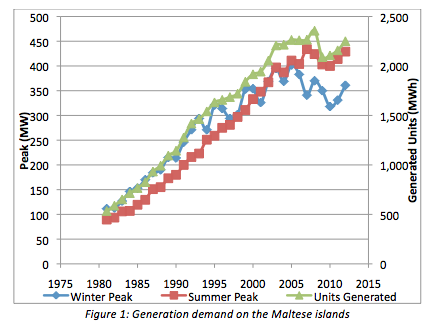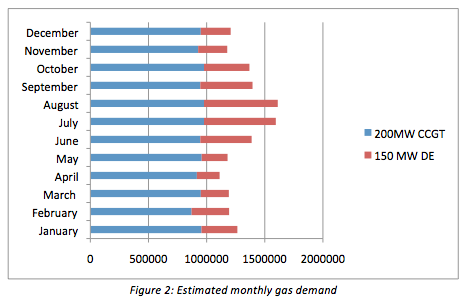Malta Seeks New Gas and Electricity Supply Agreements
On the 11th of April, the Ministry for Energy and the Conservation of Water (MECW) in Malta together with Enemalta, the state utility, will be issuing an Expression of Interest for a long-term Power Purchase Agreement and a Gas Supply Agreement.
The Ministry for Energy and the Conservation of Water in the Republic of Malta is pursuing a policy for clean, lower-cost electricity to be sourced from new investors in liquefied natural gas (LNG) storage, re-gasification and natural gas supply infrastructure and a combined-cycle gas turbine (CCGT) electricity generating plant.
This new source will reduce Malta’s dependence on electricity produced from oil, and will result in corresponding reductions in both electricity costs and environmental emissions, in line with the European Union roadmap.
Enemalta Corporation will run a competition for the new energy contracts. On the 11th of April 2013 interested parties will be invited to register for an Expression of Interest (EoI) and Request for Qualification (RfQ), which will then be followed by a Request for Proposals (RFP).
The new energy supplier will be required to supply approximately 200 MW from a new gas-fired CCGT power plant and corresponding LNG facilities which may also supply a further 150MW of existing Enemalta plant, which will be converted to run on natural gas.
In the following months, independent investors will first be pre-qualified and then will be invited to bid competitively to enter into a Power Purchase Agreement and/or a Gas Supply Agreement with a pre-condition to build, own and operate their gas and power plants at Enemalta’s Delimara site to be fully commissioned by spring 2015.
Background information on the proposed Energy Supply Agreement with Enemalta
On the 11th of April 2013, The Ministry for Energy and the Conservation of Water (MECW) together with Enemalta will issue a request for Expressions of Interest (EoI) for a long-term Power Purchase Agreement and a Gas Supply Agreement which will govern the supply of electricity and natural gas to Enemalta and are projected to come into force in the spring of 2015. The Agreements will specify terms for the capacity and availability of the gas and power supply infrastructure and the volume of gas and power delivered.
For the last 10 years, there has been an upward trend in the consumption of electricity on the Maltese Islands, although a short term decrease in consumption coincided with a period of economic contraction in the period of 2008 - 2010. The Maltese economy is now projected to continue to grow and this is expected to be accompanied by an increase in electricity demand as can be shown in Figure 1.
At the same time, Malta is completely dependent upon imported fuel oil which is combusted in mostly older low-efficiency plant. This results in high marginal costs for power generation on the islands. In addition to this, Malta is required by European Union regulations to implement directives related to combustion emissions.
Some actions have already been undertaken to address this issue, including a newly commissioned 150 MW heavy fuel oil fired power station at Delimara and a 200MW HVAC interconnector to Sicily, which is due to be completed in 2014. The Government of Malta is also intent on the decommissioning of the old Marsa Power Station as well as the older steam turbines at Delimara.
Furthermore the Government has assessed that significant reductions in cost and emissions may be obtained by generating a significant proportion of power in Malta by natural gas.
With this in mind it is the stated policy of the Government of Malta that, as of the spring of 2015, baseload power on the Islands of Malta will be supplied by means of a 200MW high efficiency gas-fired Combined Cycle Gas Turbine (CCGT) block. In addition to this, infrastructure for the receiving, storage and re-gasification of Liquefied Natural Gas (LNG) also need to be constructed and will be operational in time to supply gas to the new generating plant.
The new plant will be configured so as to operate exclusively on natural gas, which will be supplied via the LNG infrastructure. The LNG facilities may also provide natural gas to the existing 150 MW HFO fuelled internal combustion power plant, which will eventually be converted to operate on natural gas. The work required to convert the Diesel engines of the 150MW plant to run on gas will not form part of this agreement. It is proposed that the LNG facilities will be co-located onshore at Delimara Power Station. However consideration will also be given to bidders which present alternative solutions in which at least a part of the LNG Facilities is installed on a floating platform to be moored close to the Delimara Power Station. The Maltese government has estimated that a storage capacity of approximately 60,000 m3 of LNG will be required to serve both the existing 150MW plant and the newly constructed CCGT plant, however alternative proposals may be considered. The projected monthly average gas demand (15.6 TBTU annually) for the new 200MW CCGT plant and the 150MW converted Diesel engines is shown in figure 2.

The successful bidder should, if technically and economically feasible, arrange the design of both the CCGT and LNG Facilities such that waste heat from the CCGT is used in the re-gasification of LNG. The new generating plant and the LNG infrastructure will be permitted to share services with the existing Delimara Power Station. Once the new generating plant is online the Government of Malta will be able to decommission the older oil fired Delimara steam turbine generators. Phase 2 of the Delimara Power Station will remain oil fired together with some smaller oil-fired Open Circuit Gas Turbines, and will be retained as back-up for the immediate future. This project will further fulfil Malta’s obligations towards the European Union Energy roadmap and underline the Government’s commitment to cleaner, cheaper energy for the Maltese Islands.


